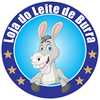Donkey Milk contains numerous nutrients. The content of n-3 fatty acids, the n-6/n-3 ratio, and short- and medium-chain fatty acids may promote positive health effects.
Milk is a source of bioactive compounds essential for the health and growth of newborns. Donkey milk, rich in lactose and whey proteins, has been proven to be a good breast milk substitute during infancy and adequate nourishment for patients with cow milk protein allergy.
A progressive decline of immune functions with age and both innate and adaptive immune responses are severely impaired and increase the susceptibility of old people to infections, tumors, and autoimmune diseases.
The legendary cosmetic and therapeutic properties of equine milk are widely known. In fact, Cleopatra, Poppea and other privileged women of ancient times took their baths in donkey’s milk in order to keep their skin fresh and shiny. In addition, Hippocrates, as well as Pliny the Elder, believed that donkey’s milk could act therapeutically in numerous cases, such as liver problems, infectious diseases, fevers, asthma, etc. (Cunsolo et al., 2011).
The antimicrobial activity of donkey milk was examined against 3 bacterial and 3 fungal strains selected on the basis of their relevance as human pathogens. All samples of donkey milk exhibited antimicrobial activity against dermatomycotic fungi and foodborne pathogen bacteria.
